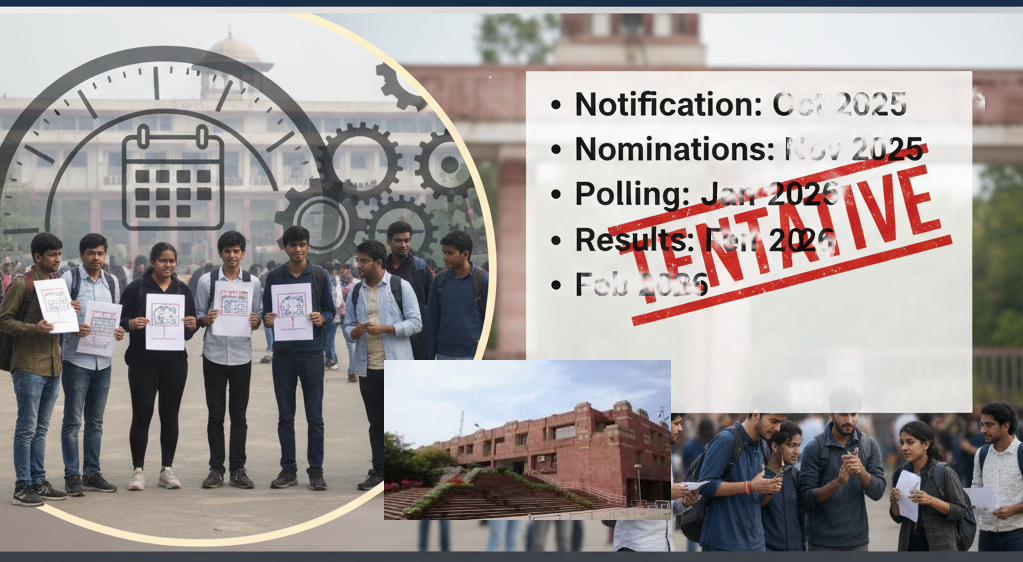Jawaharlal Nehru University Announces Important Dates for JNUSU Elections
In a recent announcement that has captured the attention of students, Jawaharlal Nehru University (JNU) has released the tentative schedule for the upcoming Jawaharlal Nehru University Students’ Union (JNUSU) elections for the academic year 2025-26. This development is significant as it marks the university’s commitment to upholding democratic processes on campus. According to the official circular, the elections are expected to take place approximately six to eight weeks after the academic session for PhD students commenced on September 12.
The schedule not only includes the JNUSU elections but also plans for conducting the Internal Committee (IC) elections for the same academic year. This dual election process aims to foster student representation across various levels within the university’s governance framework. As the university gears up for this critical event, students are encouraged to participate actively while adhering to the established guidelines that aim to ensure a fair and orderly election.
Why Elections Matter at JNU
Elections play a vital role in maintaining a vibrant and active student community. They provide a platform for students to voice their concerns and aspirations, enabling them to elect representatives who will advocate on their behalf. The JNUSU elections, in particular, hold the potential to shape campus policies and initiatives, making it crucial for students to engage thoughtfully in the electoral process. The university has emphasized that the elections must comply with all relevant laws and guidelines to uphold the integrity of the democratic process.
The JNU administration is also making it clear that accountability and transparency will be paramount during this electoral period. They have urged students to cooperate fully and maintain decorum, ensuring that the elections proceed smoothly without any disruptions. Detailed guidelines from the Office of the Dean of Students will be released ahead of the elections to provide further clarity on the process and expectations.
Understanding the Election Process
JNU has a long-standing tradition of student activism, and the JNUSU elections are a significant aspect of this history. Students run for a variety of positions, including president, vice president, general secretary, and representatives for various academic and cultural sectors. The rigorous election process prepares candidates for the responsibilities they will undertake if elected.
Before the elections commence, students are generally given the opportunity to campaign and present their visions to their peers. This campaigning phase is essential, as it allows candidates to connect with the student body, share their agendas, and discuss how they intend to address pressing issues affecting students. However, the university has reiterated the importance of maintaining a respectful and orderly environment during this campaigning period.
Students are expected to remain informed about the election process, including the eligibility criteria for candidates and voting procedures. The university will publish comprehensive details in the coming weeks, highlighting the importance of participation and engagement among the student body.
What This Means for Students
The announcement of the tentative election schedule is a critical milestone for students at JNU. With the university being an epicenter for political dialogue and activism, the forthcoming elections will not only shape the student body’s leadership but also influence broader issues concerning academic policies, welfare, and campus culture. As students gear up to participate, their input will be crucial in selecting representatives who align with their interests and aspirations.
As the academic year progresses, it’s essential for students to stay updated with the official communications from the university. Students can review related information on the JNU website and are encouraged to participate in discussions regarding the upcoming elections. By engaging actively, students can ensure that their voices are heard and their needs are adequately represented in the university’s decision-making processes.
The university is also working on providing a transparent and fair electoral environment. Initiatives aimed at educating students about the elections, their rights, and responsibilities will be on the agenda. The emphasis on fair practices reflects the university’s commitment to democracy and student welfare.
Broader Implications for Student Governance
The JNUSU elections are not just a routine event; they signify the health of student governance within JNU. A successful election cycle can lead to a spirited engagement among students, fostering a culture of collaboration and activism. On the other hand, any disruptions during the elections could undermine student trust in the electoral process, making it imperative for all stakeholders to prioritize fairness and transparency.
Furthermore, the elections at JNU may inspire other institutions to reflect on their own election processes and student engagement strategies. As student unions across India face various challenges, the successful execution of JNUSU elections could serve as a model for enhancing democratic practices within student organizations nationwide.
As the JNUSU elections approach, it is crucial for students to embrace their roles as informed voters and engaged citizens. The decisions made during this electoral process will have lasting impacts on the university’s environment and student life.
What This Means Going Forward
As we look ahead to the upcoming JNUSU elections, the focus will remain on ensuring a fair and participative electoral process. Students must prepare to vote, understand the candidates’ platforms, and evaluate how each candidate’s proposals align with their aspirations. The university’s steps to encourage cooperation among students signal a promising atmosphere for democratic engagement that could influence policy and student life for years to come.
For more updates about JNU’s electoral initiatives and student governance, students may visit the university’s official communications or check out reports from credible sources like BBC and Reuters. Engaging with these platforms will help students stay ahead of any developments leading to the elections, empowering them to make informed decisions when casting their votes.
According to the report by[JNU News](https://www.jnu.ac.in), students should regularly check for updates on the election process and guidelines to ensure their active participation in shaping their student leadership for the academic year 2025-26.


